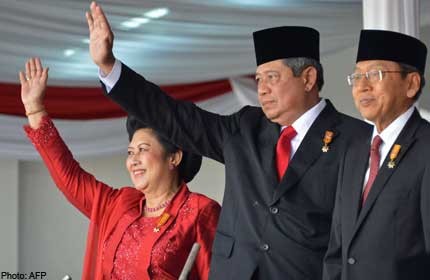Jakarta to boost investment climate

INDONESIA - Indonesia will take steps to ensure food prices remain stable and to improve its investment climate as the rupiah hit a four-year low against the US dollar and the stock market index plunged 11 per cent over the past week.
At the close of trading on Wednesday, the rupiah dropped below 10,800 to the dollar, although the Jakarta Composite Index rose for the first time in five days after the state pension fund bought substantial stocks.
Measures aimed at preventing the value of the rupiah from deteriorating further and saving jobs will be announced Friday, President Susilo Bambang Yudhoyono said after a Cabinet meeting.
Ministers say these will include reducing red tape for business permits to make it easier for investors to start and expand operations here, and loosening import curbs on staple foods.
"We will relax regulations that all these years have been deemed strict and excessive," Industry Minister M.S. Hidayat said, citing rules in oil, gas and mineral resource investments, among others. Tax breaks are also coming.
Dr Yudhoyono said that Indonesia has to rely on investment to help spur growth, because its exports are declining as global demand softens.
It would be tough for Indonesia to meet the 6.3 per cent growth target this year, though any deviation should not be too far off, he added, noting that government projects will be sped up.
Indonesia's economic growth in the second quarter this year came in under 6 per cent for the first time since 2010.
Last Friday, Dr Yudhoyono announced a 2014 Budget with a "keep buying strategy" to prop up domestic consumption, a key driver of the economy. On Tuesday, Bank Indonesia said the consumer confidence index fell to a 14-month low, from 117 in June to 108 points last month.
Local media and observers have also drawn parallels between the current turmoil and the 1998 Asian financial crisis, as well as the 2008 crisis.
The latest moves come as Indonesia saw a record current account deficit last month. It topped US$9.8 billion (S$12.4 billion), or 4.4 per cent of gross domestic product, as inflation rose to 8.6 per cent after the government cut hefty fuel subsidies in June that were putting pressure on the trade balance.
Trade Minister Gita Wirjawan also indicated that import curbs on food items like beef would be eased to keep prices in check. "Our goal is to maintain price stability at home so we really need to take prompt action to bring in enough supplies."

Get a copy of The Straits Times or go to straitstimes.com for more stories.